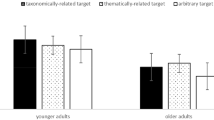Summary
This study investigates the role of working-memory capacity in reading comprehension in young and older subjects. A task yielding separate measures for processing and storage components was used to assess working-memory capacity. A French version of the Nelson-Denny test was administered as a measure of abilities that underlie reading comprehension. In the working-memory task, recall performances were lower in older subjects. Nevertheless, the intercorrelations suggested that the age-related impairment was probably linked to the processing component. Mean scores on the reading-comprehension test did not differ between groups. However, scores were correlated with processing time on the working-memory task in younger subjects, but with storage capacity in older subjects.
Similar content being viewed by others
References
Babcock, R., & Salthouse, T. A. (1990). Effect of increased processing demands on age differences in working memory. Psychology and Aging, 5, 21–429.
Baddeley, A. (1981). The concept of working memory: A view of its current state and probable future development. Cognition, 10, 17–23.
Baddeley, A. (1986). Working memory. Oxford Psychology Series, vol. 11. Oxford: Clarendon Press.
Baddeley, A. (1990). Human memory: Theory and practice. London: Lawrence Erlbaum Associates Ltd.
Baddeley, A. (1992). Is Working Memory Working? The Fifteenth Bartlett Lecture. The Quarterly Journal of Experimental Psychology, 48A (1), 1–31.
Baddeley, A., & Hitch, G. (1974). Working memory. In G. H. Bower (Ed.), The psychology of learning and motivation, vol. 8, pp. 47–89, New York: Academic Press.
Baddeley, A., Logie, R., Nimmo-Smith, J., & Brereton, R. (1985). Components of fluent reading. Journal of Memory and Language, 24, 119–131.
Baker, L. (1985). Working memory and comprehension: A replication. The Bulletin of Psychology Society, 23, 28–30.
Carpenter, P., & Just, M. (1988). The role of working memory in language comprehension. In D. Klahr & K. Kotovsky (Eds.), Complex information processing: The impact of Herbert A. Simon, pp. 31–68, Hillsdale, NJ: Erlbaum.
Cohen, G. (1981). Inferential reasoning in old age. Cognition, 9, 59–72.
Daneman, M., & Carpenter, P. (1980). Individual differences in working memory and reading. Journal of Verbal Learning and Verbal Behavior, 19, 450–466.
Daneman, M., & Carpenter, P. (1983). Individual differences in integrating information between and within sentences. Journal of Experimental Psychology: Learning, Memory and Cognition, 9, 61–584.
Daneman, M., & Tardif, T. (1987). Working memory and reading skill reexamined. In M. Coltheart (Ed.), Attention and performance XI. The psychology of reading, pp. 491–508. Hillsdale NJ: Erlbaum.
Dixon, P., Lefevre, J., & Twilley, L. (1988). Word knowledge and working memory as predictor of reading skills. Journal of Educational Psychology, 80, 465–472.
Dobbs, A., & Rule, B. (1989). Adults' age differences in working memory. Psychology and Aging, 4, 500–503.
Ehrlich, M-F., Charles, A., & Tardieu, H. (1992). La superstructure des textes expositifs est-elle prise en charge lots de la sélection des informations importantes? In M. Charolles & A. Petitjean (Eds.), Le résumé de textes: aspects linguistiques, sémiotiques, psycho-linguistiques et automatiques. Paris, Klincksiek.
Ehrlich, M-F., & Delafoy, M. (1990). La mémoire de travail: structure, fonctionnement, capacité. L'Année Psychologique, 90, 403–428.
Ehrlich, M-F., & Suez, L. (1989). Mémoire et vieillissement: comprehension et rappel d'un texte chez des sujets de 21 et 64 ans. XXIIème Journée d'Etudes de l'APSLF. “Le vieillissement.” Geneva.
Engle, R. W., Cantor, J., & Carullo, J. J. (1992). Individual differences in working memory and comprehension. A test of four hypotheses. Journal of Experimental Psychology: Learning, Memory and Cognition, 18, 972–992.
Foos, P. (1989). Adults' age differences in working memory. Psychology and Aging, 4, 269–275.
Gick, M., Craik, F. I. M., & Morris, R. (1988). Task complexity and age differences in working memory. Memory & Cognition, 16, 353–361.
Gilinsky, A. S., & Ehrlich, M-F. (1989). Logic, belief, working memory and age. In A. F. Bennett & K. M. McConkey (Eds.), Cognition in individual and social context, pp. 283–293. Amsterdam: Elsevier (North-Holland).
Hartley, J. (1986). Reader and text variables as determinants of discourse memory in adulthood. Psychology and Aging, 1, 150–158.
Hartley, J. (1988). Aging and individual differences in memory for written discourse. In L. L. Light & D. M. Burke (Eds.), Language, Memory and Aging, pp. 36–57. New York: Cambridge University Press.
Hasher, L., & Zacks, R. (1988). Working memory, comprehension and aging: A review and a new view. In G. H. Bower (Ed.), The Psychology of Learning and Motivation, Vol. 22, pp. 193–225, New York: Academic Press.
Just, M. A., & Carpenter, P. A. (1992). A capacity theory of comprehension: Individual differences in working memory. Psychological Review, 99, 122–149.
Light, L. L., & Anderson, P. (1985). Working memory capacity, age and memory for discourse. Journal of Gerontology, 40, 737–747.
Masson, M., & Miller, J. (1983). Working memory and individual differences in comprehension and memory of text. Journal of Educational Psychology, 75, 314–318.
Morris, R., Gick, M., & Craik, F. I. M. (1988). Processing resources and age differences in working memory. Memory & Cognition, 16, 362–366.
Pratt, M. W., Boyes, C., Robin, S., & Manchester, M. (1989). Telling tales: Aging, working memory and the narrative cohesion of story retellings. Developmental Psychology, 25, 628–635.
Salthouse, T. A. (1988). The role of processing resources in cognitive aging. In M. L. Howe & C. J. Brainerd (Eds.), Cognitive development in adulthood, pp. 185–239. New York: Springer-Verlag.
Salthouse, T., Babcock, R., & Shaw, R. (1991). Effect of adult age on structural and operational capacities in working memory. Psychology and Aging, 6, p. 118.
Spilich, G. (1983). Life-span components of text processing: Structural and procedural differences. Journal of Verbal Learning & Verbal Behavior, 22, 231–244.
Stine, E., & Wingfield, A. (1990). How much do working memory deficits contribute to age differences in discourse memory? European Journal of Cognitive Psychology, 2, 289–304
Author information
Authors and Affiliations
Rights and permissions
About this article
Cite this article
Ehrlich, MF., Brébion, J. & Tardieu, H. Working-memory capacity and reading comprehension in young and older adults. Psychol. Res 56, 110–115 (1994). https://doi.org/10.1007/BF00419718
Received:
Accepted:
Issue Date:
DOI: https://doi.org/10.1007/BF00419718




